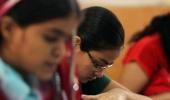'Most students find it difficult to cope with the way they are expected to learn at the IITs.'
'So, all the students face the same stress.'
'But those students who are mentally weak are more affected.'
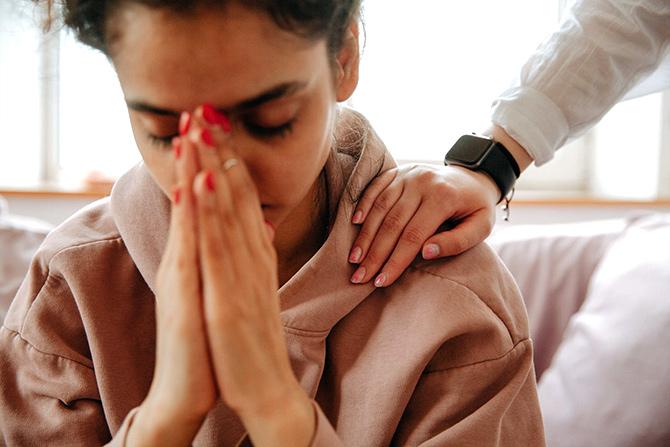
On the 12th of February, an 18-year-old student at IIT-Bombay jumped from the seventh floor of his hostel block.
On the 13th of February 2023, a 27-year-old research scholar was found dead in his room at IIT-Madras.
On the 14th of February, a 24-year-old student was found hanging from the ceiling of his hostel room at IIT Madras.
According to data presented in the Rajya Sabha by the ministry of education, 33 students from various IITs in India have died by suicide in the last 5 years.
Why do these students studying at the premier institutions in India end their lives like this? Academic pressure? Family pressure? Societal pressure?
"Students should have the option to pick and choose the subjects they want to study. See, everybody cannot be an engineer. One guy may like basic science or cosmology or physics. Students should be able to choose the subjects of their choice. But here, that kind of freedom is not available," Dr M S Gopinathan -- who was a professor of chemistry at IIT-Madras from 1977-2005 -- tells Rediff.com's Shobha Warrier.
According to a recent report, in the last five years 33 students studying at various IITs died by suicide, and if you were to include the NITs and IIMs, the number goes up to 61.
You had spent so many years teaching at IIT-Madras. Do you think this is a new phenomenon or was it there earlier too?
Suicides were there earlier too; of course, not on this scale.
There might have been one or two suicides every year.
I'm talking about what happened more than 30 years ago when I was teaching at IIT-Madras.
But you must remember there were only five IITs in those days and today you have 20! So, the number of suicides also will go up.
The reason why this is happening is multi-faceted.
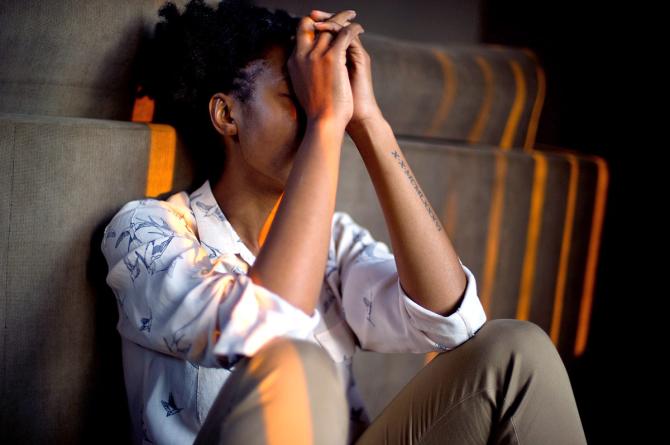
The minister of state for education told the Rajya Sabha that the reasons behind the suicides are academic stress, family and personal reasons and mental health issues. Do you agree with him?
Yes, he is right about academic pressure. But academic pressure is there not only for those students who commit suicide, it is there for all.
It is because our school education system is all about rote learning while in IITs, you need analytical thinking.
There is a vast difference between the way you learn in school and how you learn at the IITs.
Most students find it difficult to cope with the way they are expected to learn at the IITs.
So, all the students face the same stress. But those students who are mentally weak are more affected.
I had noticed that students who come from the villages where they have a deficient school system feel their social status is very low and their lingo quite different from the majority of students here.
So, these students have not just academic stress, but social, linguistic and financial stress too because they come from a poor rural background. But academic pressure is there for all.
Most of the students who get into the IITs come from leading schools and majority of them come there after underdoing special tuition classes.
Running special tuition classes to help students to get into the IITs has grown as an industry now.
For example, Kota in Rajasthan. And tuition starts very early in school life, and it continues for many years.
Remember it is very expensive, so it is affordable only to the rich urban class.
This creates a class distinction in the IITs.
All the IITs have to adhere to the reservations based on caste followed by the government.
The students who come under the reservation system are the ones who suffer the most from cultural, linguistic, social, and financial backwardness.
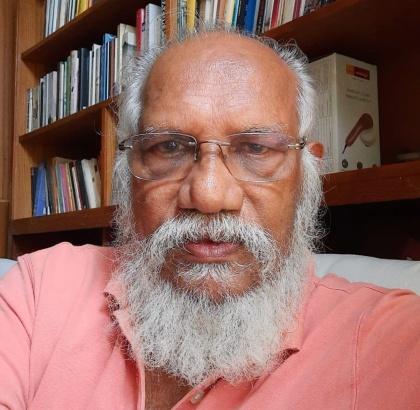
IMAGE: Dr M S Gopinathan, professor at IIT-Madras (1977-2005).
You spoke about rich urban students going to tuition classes where again the teaching is done only to clear the entrance examination. Do these students also find it difficult to cope?
It is a very important point to ponder. If you look at the students who go for what I call, the Kota syndrome, they have to write several examinations similar to the IIT entrance exams. And many of the students who go there fail in these examinations, and when they fail, so many of them commit suicide there.
There are a number of suicides among the Kota tuition students.
Because their parents spend a lot of money sending their children to these tuition centers, it puts a lot of pressure on these students.
When they fail, they cannot face their parents, they cannot go back, and they consider themselves failures in life. Then they think of committing suicide.
So, suicides are not confined to IITs after admission, but prior to IIT admission also, it is happening. It is mainly due to parental pressure.
According to Indian parents, if their children do not study at an IIT or go to a medical college, they are failures.
So, students think they have failed their parents when they do not get admission to the premier institutions, or pass the exams once they are admitted.
The same thing happens to those who make it to the IITs through the reservation system.
We have reservation to bring those who are down in the social ladder to the level of others. If those students find it difficult to cope with, for example at an IIT, how can you tackle the problem?
It is a complex problem. We have quite a few schemes to tackle this issue.
One is to give special tuitions to the weak students, those who do poorly in academics. It has nothing to do with caste or reservation.
But then, these students would not attend the classes because they felt they were being discriminated against by calling them weak students.
Then, we decided to give an introductory training for one whole year for these students, the marks they scored would not count in their final grade.
It was done to make them familiarise with the course. That also was not successful because students felt they were being discriminated against.
We always allot hostel rooms randomly. When students who come from rural areas and under reservation get to share rooms with those from the cities and those belong to higher castes, they feel discriminated against by the city guy or the one belonging to the upper castes.
The student from the city talks in English fluently and watches English films with his friends. And this guy feels left out culturally, unable to mingle socially.
This puts a lot of pressure on the boy from the rural area.
Do you think the problems students from the rural areas and who got admission under reservation face are social problems, and unless the society changes, these problems will not go?
Yes, these are very complex deep-rooted social problems.
I read what the minister claimed as a solution; that the IITs have become elitist institutions and to reduce the pressure on students, we must dilute the syllabus. That's not the solution.
Today if the IITs are respected globally among the best educational institutions, it is because we stick to high standards of education.
If you dilute the academic standards at the IITs, the IIT brand itself will lose its charm. So, this shouldn't be done at all.
Yes, we cannot do much to ease the social and cultural pressure, we can help students in taking academic pressure from them.
What we can do academically is make the course more relaxed for the students.
For example, if a student is weak and cannot manage 5 or 6 subjects in a semester, let him opt for two or three subjects. It would mean longer years. But that doesn't matter.
This is like a race where everybody cannot come first. Those who can finish the course faster, let them.
Those who need more time, let them take longer time, as some are slow, and some are fast.
So let the fast ones go faster, and the slow ones take their own time with a lighter academic load.
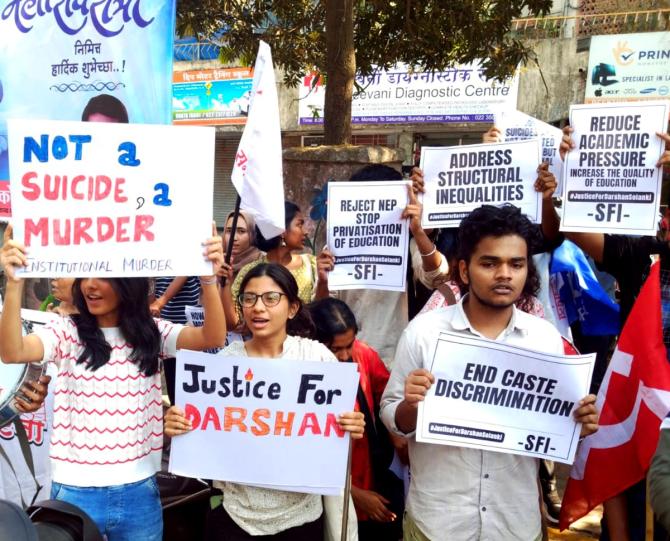
You mean, like what is followed by most universities in the world?
Yes. Not only that, students should have the option to pick and choose the subjects they want to study.
See, everybody cannot be an engineer. One guy may like basic science or cosmology or physics.
The students should be able to choose the subjects of their choice. But here, that kind of freedom is not available.
The syllabus is rather rigid in all the IITs.
You have to finish all the courses given to you, get A or B or the minimum grade in each one of the subjects. You cannot expect every student to be good in all the subjects.
Most foreign universities give the freedom to students to choose the courses you like, not just engineering or science courses but you can choose courses in arts or humanities or sculpture or whatever you like.
Why are we so rigid about our academic system? Why is it that even now, we are not able to look at academics from a different perspective?
This is the hangover of the colonial educational system we had followed.
The British colonists wanted only clerks so, they had a rigid education system to create clerks.
But the British education system has changed now...
Yes, they have all changed, but we have not.
You did years of post-doctoral research at Oxford, Canada and Germany. What do you think we can adopt from those education institutions?
There is a lot of academic freedom for students in the in those universities, which we don't have.
That is the first thing Indian universities can do; give students the freedom to choose the courses which is to their aptitude and liking.
For example, Albert Einstein himself failed in many school courses. He was good only in mathematics.
So, by our standards, he would never even get out of school. That is the major difference.
If a student has the freedom to do what he likes, he will excel in it.
The next thing is, when I was there nobody asked me what my caste was or what religion I followed.
At the faculty level, because of historical reasons, we have a large number of faculty from the higher castes and naturally they come with their own prejudices too. So, whenever there is a problem, they look at it with that bias.
This kind of bias is not there in the Western education system.
They may have their own bias in the social, political, religious and social sphere but not in the education system.
And another reason why students who come to the universities excel is, only those who are interested in academics go to the universities.
There are other opportunities available for those who are not interested in higher studies.
As we are not industrially developed, other opportunities are low. Now it is changing, still it is relatively much less.
Because the students have a lot of options available after the school, only very few go for higher university education. Here, everybody goes to the university.
We have so many universities and many are controlled by politicians and are corrupt.
No politician has any say in the appointment of the chancellors or faculty there. Universities are independent politically and socially.
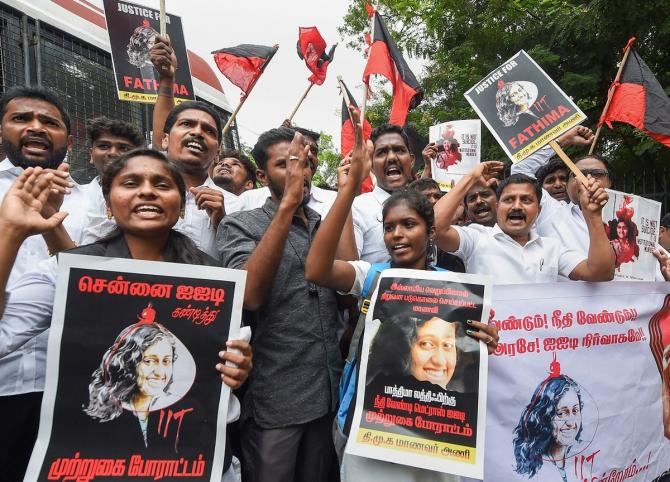
When we spoke of academic pressure, you said the problem starts at the school level where analytical thinking is not there; only rote learning. Do you feel we have to change our school education system first?
Exactly. If you look at the school education system of, for example in the UK, Europe or the US, you will see that students do not mug up information and facts.
What they are taught there is, how to generate information. I would call it, learning to learn.
They are taught how to approach a problem, and then find a solution. They are not asked to mug up the solution.
This is how they approach learning at the primary level itself.
A couple of surveys conducted by IIT-Bombay found the caste bias is the major reason for the mental health problems faced by scheduled caste and scheduled tribe students. Do you think so?
Yes, it is true.
As they come from a backward social and economic condition, they carry this baggage with them.
I wouldn't blame the fellow who is from the lower caste or the one who is from the higher caste. This discrimination is built in our system.
So, this is a social problem...
Yes, it is a social problem, and it exists in our society. This kind of discrimination is built in the system.
And it may have its repercussions in the academic field also like it is there in all other fields.
It is alleged that some professors show discriminatory attitude towards students from the lower castes. Sometime back, complaints about some professors at IIT-Madras were raised by a few faculty members for their Brahminical attitude. Did it really exist at IIT-Madras? You taught there for a long time.
Yes, it (Brahminical dominance) is there.
There is another side to it also. Professors belonging to the lower castes are very few in number.
The caste-based vacancies do not even get filled up at the faculty level because a certain standard is required for the appointment as faculty at an IIT.
They start at the assistant professor level. That is where the reservation applies.
There is no reservation for promotions. So if you want to be promoted to associate professor and then to full professorship, it is done internally by a committee.
There has been a lot of complaints by those coming from lower castes at the promotion level, because a majority of professors at the committee are from higher castes.
When they don't get promoted, they complain of bias. Even when they do not do well, they complain of bias.
There have been instances of them going to court saying he was denied promotion because of his caste.
Feature Presentation: Rajesh Alva/Rediff.com




